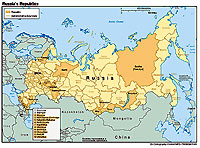S&P Takes Mixed View of Direct Gubernatorial Elections
Howard Amos - Moscow Times - themoscowtimes.com - 3.22.12 - JRL 2012-54
One-quarter of Russia's 83 governors are likely to be replaced in 2012, credit rating agency Standard & Poor's said in a report released late Wednesday.

The highly expected turnover is linked to the 17 governors whose terms expire this year, the weakening support for United Russia, the ongoing political reshuffling at the federal level and a proposal by President Dmitry Medvedev to change election procedures.
Only five governors were replaced between January and November 2011, but the pace has picked up since the Dec. 4 Duma elections with another five dismissals in the last 3 1/2 months.
Standard & Poor's, or S&P, said the lack of democratic accountability enjoyed by the current cohort of centrally appointed governors means the naming of a new governor rarely has an impact on the credit-worthiness of a region.
"Any immediate changes to the budget by newly appointed governors have mostly been restricted to suspending investment projects initiated by the previous regime," S&P said.
Governors are rarely dismissed on the basis of their fiscal capabilities, and regions suffer from a lack of financial and institutional sophistication, said the credit rating agency, adding that "the process of governor appointments has so far lacked transparency."
If a proposal by Medvedev to reintroduce the direct election of governors becomes law, however, it could give the local powerbrokers more significance in determining the rating profile of their regions.
President-elect Vladimir Putin abolished direct elections of governors in 2004 after the Beslan school siege but has expressed support for reinstating the procedure. Legislation is currently being considered by the State Duma.
Direct elections would, said S&P, force candidates to announce their policies in advance of polls and strengthen institutional frameworks through accountability. But it is not a simple correlation between elections and positive developments.
"If the regions' debt and liquidity management were to become less prudent as a result of direct elections," S&P said, "we would not rule out the possibility of negative rating actions on regions."
Keywords: Russia, Government, Politics - Russia, Investment - Russian News - Russia
One-quarter of Russia's 83 governors are likely to be replaced in 2012, credit rating agency Standard & Poor's said in a report released late Wednesday.

The highly expected turnover is linked to the 17 governors whose terms expire this year, the weakening support for United Russia, the ongoing political reshuffling at the federal level and a proposal by President Dmitry Medvedev to change election procedures.
Only five governors were replaced between January and November 2011, but the pace has picked up since the Dec. 4 Duma elections with another five dismissals in the last 3 1/2 months.
Standard & Poor's, or S&P, said the lack of democratic accountability enjoyed by the current cohort of centrally appointed governors means the naming of a new governor rarely has an impact on the credit-worthiness of a region.
"Any immediate changes to the budget by newly appointed governors have mostly been restricted to suspending investment projects initiated by the previous regime," S&P said.
Governors are rarely dismissed on the basis of their fiscal capabilities, and regions suffer from a lack of financial and institutional sophistication, said the credit rating agency, adding that "the process of governor appointments has so far lacked transparency."
If a proposal by Medvedev to reintroduce the direct election of governors becomes law, however, it could give the local powerbrokers more significance in determining the rating profile of their regions.
President-elect Vladimir Putin abolished direct elections of governors in 2004 after the Beslan school siege but has expressed support for reinstating the procedure. Legislation is currently being considered by the State Duma.
Direct elections would, said S&P, force candidates to announce their policies in advance of polls and strengthen institutional frameworks through accountability. But it is not a simple correlation between elections and positive developments.
"If the regions' debt and liquidity management were to become less prudent as a result of direct elections," S&P said, "we would not rule out the possibility of negative rating actions on regions."